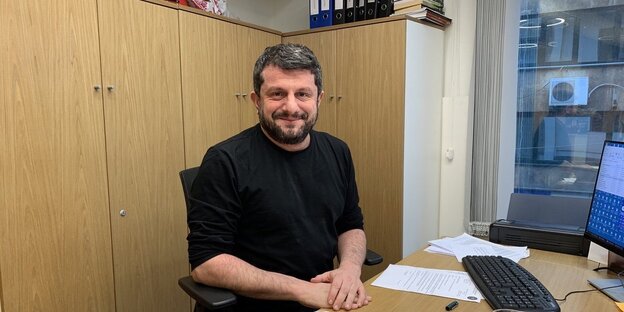The office of Turkey’s top prosecutor has found the continued incarceration of an opposition lawmaker legally appropriate despite a recent ruling from the country’s Constitutional Court stating that the lawmaker’s rights have been violated, the Cumhuriyet daily reported on Tuesday.
Can Atalay, an opposition lawmaker from the Workers Party of Turkey (TİP), filed a petition with Turkey’s Constitutional Court in July claiming that he has been subjected to several rights violations due to his continued incarceration despite acquiring parliamentary immunity after winning a seat in the legislature in May.
The prosecutor’s opinion comes after the Constitutional Court ruled that Atalay’s right to be elected and to engage in political activity as well as his right to personal liberty and security had been violated.
The opinion highlights Article 14 of the Turkish Constitution, which pertains to the conditions under which fundamental rights and freedoms may be limited. It references the previous decision by the 3rd Criminal Chamber of the Supreme Court of Appeals that denied Atalay’s release during his appeal.
The Chief Public Prosecutor’s Office of the Supreme Court of Appeals asserts in its opinion that the Constitutional Court is limited to questions of legality and constitutional oversight and cannot create new legal norms or reinterpret existing constitutional norms to achieve a particular outcome. The opinion emphasizes that the courts should act as arbiters ensuring adherence to established rules, not as entities that “rewrite the rules of the game.”
The prosecutor’s office has argued that Atalay is not entitled to legislative immunity for actions preceding his election, contending that the investigation and subsequent legal proceedings against Atalay for offenses committed in 2013 began well before he was elected to parliament.
Atalay is one of seven defendants sentenced to 18 years by an İstanbul court in April 2022 in a trial concerning the anti-government Gezi Park protests of 2013, which erupted over government plans to demolish Gezi Park in Taksim. He was given an 18-year sentence for his alleged role in the protests. His sentence, along with those of four others including prominent businessman Osman Kavala, was upheld by the Supreme Court of Appeals in September.
He has been in prison since April 25, 2022 on charges of “assisting in the overthrow of the government.”
Prosecutor’s office cannot contradict the Constitutional Court
Deniz Özen, Atalay’s lawyer, told Cumhuriyet in an exclusive statement that the prosecutor’s opinion is legally untenable and unacceptable. Özen claims that the authority to interpret constitutional articles lies solely with the Constitutional Court and that the Supreme Court of Appeals prosecutor’s office is, therefore, not authorized to make a contradictory interpretation.
Özen’s main argument refers to the binding nature of the decisions of the Constitutional Court as stipulated in Article 153 of the Turkish Constitution. If the 3rd Criminal Chamber of the Supreme Court of Appeals follows the opinion of the prosecutor and does not release Atalay, it would mean that the authority of the Constitutional Court would be undermined to the point of overriding it, Özen warns.
The İstanbul 13th High Criminal Court on Oct. 30 forwarded the Constitutional Court’s decision on Atalay to the Supreme Court of Appeals, which had previously upheld Atalay’s conviction.
The Constitutional Court announced its ruling in Atalay’s case on Oct. 25 and said Turkey violated Article 67 of the Turkish Constitution, which concerns the right to elect, stand for election and engage in political activities, as well as Article 19, involving the right to liberty and security. Atalay will be paid TL 50,000 in non-pecuniary damages in line with the court’s ruling.
The top court subsequently sent a copy of its decision on Atalay to the İstanbul 13th High Criminal Court to eliminate the rights violations Atalay was subjected to, which would mean his release from prison.
However, the court, instead of ruling for Atalay’s release, sent the decision to the 3rd Criminal Chamber of the Supreme Court of Appeals, claiming that the rights violations suffered by Atalay stem from the ruling of the 3rd Criminal Chamber of the Supreme Court of Appeals, hence it is not within its jurisdiction to rule for his release.
The lower court’s move came despite a call from Chief Justice Zühtü Arslan earlier that day to comply with the Constitutional Court’s decisions.



